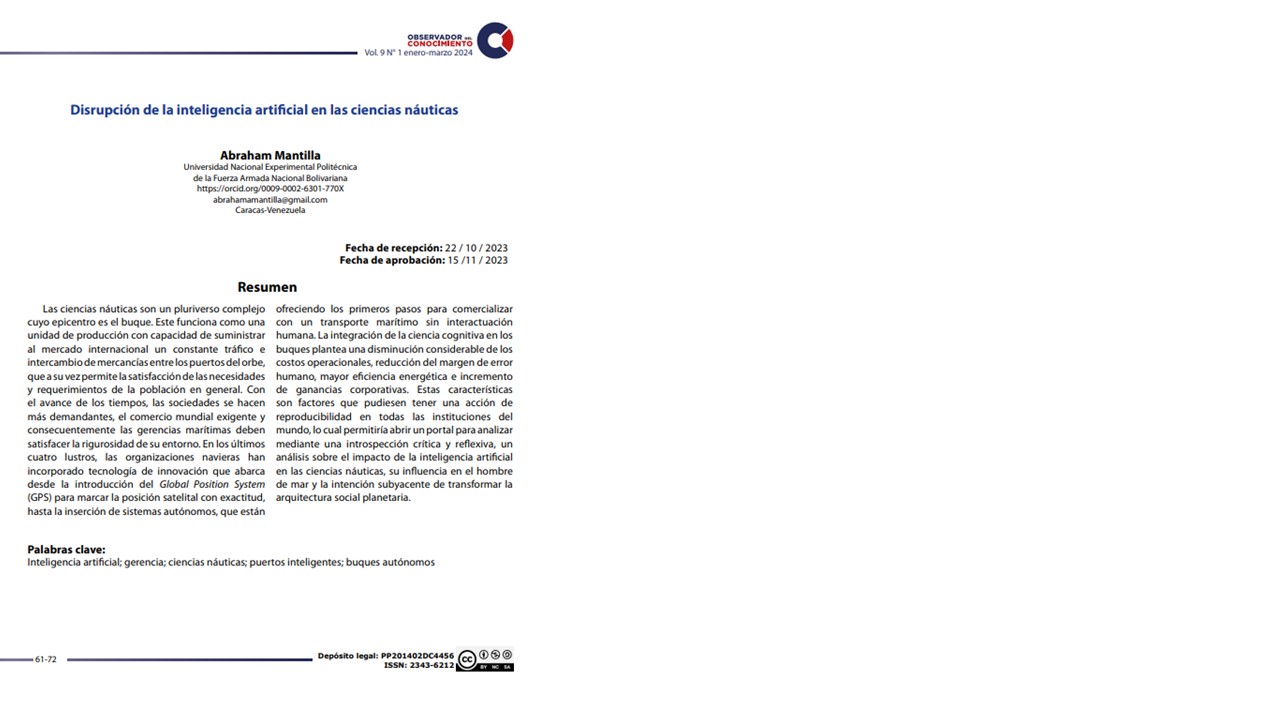Disruption of artificial intelligence in nautical sciences
Keywords:
Intelligence artificial, management, nautical sciences, intelligent ports, autonomous shipsAbstract
The nautical sciences are a complex multiverse whose epicentre is the vessel, which functions as a production unit with the capacity to supply the international market with constant traffic and exchange of goods between the ports of the world, which in turn allows the satisfaction of the needs and requirements of the population in general. With the advancement of time, societies are becoming more demanding, world trade more demanding and consequently maritime management must satisfy the rigorousness of its environment. In the last four decades, shipping organizations have incorporated innovative technology ranging from the introduction of the Global Position System (GPS) for accurate satellite positioning, to the insertion of autonomous systems, which are providing the first steps to trade with maritime transport without human interaction.
Downloads
References
Aita, D. (2022). Digitalización en puertos: aplicación de gemelos digitales en la complejidad logística. Bole- tín FAL, N° 393, pp. 1-13. Disponible en: https://repo- sitorio.cepal.org/items/2c03518f-d678-450b-b81a- 0a034085fc40.
Boden, M. (2017). Inteligencia artificial. Madrid: Tur- ner publicaciones.
Estudios Marítimos Naucher, SL (2023). La Revo- lución de la inteligencia artificial en el transporte ma- rítimo. Naucher Global. Disponible en: https://www. naucher.com/la-revolucion-de-la-inteligencia-artifi- cial-en-el-transporte-maritimo/.
Finanzas.com (2018). Los primeros buques autó- nomos sin tripulación operarán en 2025, según la OMI. Disponible en: https://www.finanzas.com/empresas/ los-primeros-buques-autonomos-sin-tripulacion-ope-
raran-en-2025-segun-la-omi_13858787_102.html.
González, C. (2022). Este es el primer buque au- tónomo controlado por IA que recorre 10.000 km en
días, sin ningún fallo. Computer Hoy. Disponi- ble en: https://computerhoy.com/noticias/tecnolo- gia/primer-buque-autonomo-controlado-ia-reco- rre-10000-km-33-dias-ningun-fallo-1074647.
Guzmán, J. (2023). Puertos inteligentes: tecnologías que permiten los smart ports. Izertis S. A. Disponible en: https://www.izertis.com/es/-/tecnologias-habilitado- ras-para-los-smart-ports.
Hawking, S. (2013). Historia del tiempo. Barcelona: Editorial Crítica.
Kaurzweil, R. (1999). La era de las máquinas espiri- tuales. Barcelona: Editorial Planeta.
Lanz, R. (1998). Temas Post modernos: Crítica de la razón formal. Caracas: Editorial Tropikos.
Lanz, R. (2001). Organizaciones transcomplejas. Ca- racas: Editorial Imposmo.
Leal, S. (2022). Y de repente llegó el Metaverso. Bar- celona: Editorial Plataforma.
Madruga, A. (2013). Inteligencia artificial, el futuro del hombre. Washington: Editorial Amazon.
Mundo Marítimo (2019). China construye la pri- mera base de pruebas de I+D para buques autónomos. Disponible en: https://www.mundomaritimo.cl/no- ticias/china-construye-la-primera-base-de-prue- bas-de-id-para-buques-autonomos.
Organización Marítima Internacional (OMI) (2019). Directrices provisionales relativas a los ensayos de los MASS. Comité de Seguridad Marítima. Londres: OMI. Disponible en: https://www.imo.org/es/MediaCentre/ MeetingSummaries/Paginas/MSC-Default.aspx.
Organización Marítima Internacional (OMI) (2021). Resultados del estudio exploratorio sobre la reglamen- tación para el uso de buques marítimos autónomos de superficie (MASS). Cómite de Seguridad Marítima. Londres: OMI. Disponible en: https://wwwcdn.imo. org/localresources/es/MediaCentre/Documents/ MSC.1-Circ.1638%20%20Resultados%20Del%20Es- tudio%20Exploratorio%20Sobre%20La%20Regla- mentaci%C3%B3n%20Para%20El%20Uso%20De%20 Buques%20Mar%C3%ADtimo...%20(Secretar%- C3%ADa).pdf.
Peral, A. y Alcaide, J. (2021). Los puertos inteligentes: elementos para un desarrollo sostenible. Luces en el Ca- mino: Filosofía y Ciencias Sociales en tiempo de descon- cierto. Madrid: Dykinson. pp. 2230-2248.
Wojtyla, K. (2001). Persona y acción. Madrid: Edito- rial Palabra.

Downloads
Published
How to Cite
Issue
Section
License

This work is licensed under a Creative Commons Attribution-NoDerivatives 4.0 International License.







